In this article, we will delve into the fascinating world of Cameroon ethnic groups. Discover the diverse cultures, traditions, and heritage that make up the tapestry of Cameroon today.
Key Takeaways:
- Cameroon is a culturally diverse country with over 200 ethnic groups.
- Each ethnic group has its unique customs, languages, and practices.
- The ethnic diversity in Cameroon contributes to the country’s cultural richness.
- Exploring Cameroon’s ethnic groups allows us to appreciate their traditions, celebrations, art, and culinary delights.
- The preservation of Cameroon’s cultural heritage is an ongoing effort.
Introduction to Cameroon’s Ethnic Diversity
Welcome to the fascinating world of Cameroon ethnic diversity! With over 200 distinct ethnic groups, Cameroon is a true melting pot of cultures, traditions, and languages. Each ethnic group brings its unique customs and practices, contributing to the rich cultural tapestry of this country.
Explore the significance of ethnic diversity in Cameroon’s society and how it enhances the country’s cultural richness. Discover how the coexistence of numerous ethnic groups has shaped Cameroon’s heritage and influenced its social fabric. From the rich history of these groups to their vibrant traditions, there is so much to learn and appreciate about the ethnic diversity in Cameroon.
Cameroon’s ethnic diversity plays a crucial role in fostering tolerance, understanding, and unity among its people. By recognizing and embracing the uniqueness of each ethnic group, Cameroon celebrates its cultural mosaic, promoting a sense of national identity that transcends individual differences. The distinct customs, languages, and practices create a vibrant and harmonious society, where diversity is cherished and celebrated.
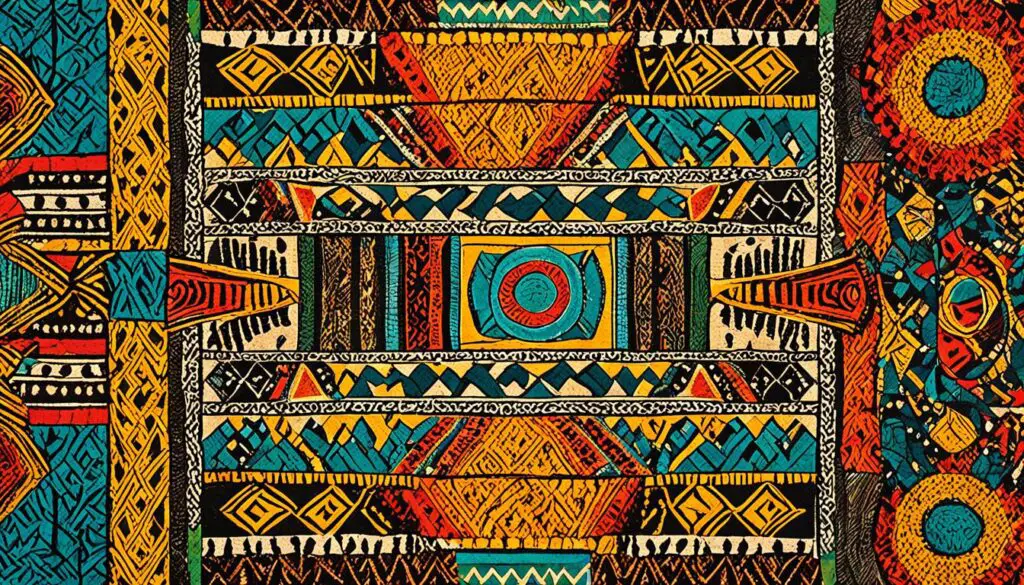
The Largest Ethnic Groups in Cameroon
Cameroon is home to a diverse array of ethnic groups, each contributing to the cultural mosaic that defines the nation. Among them, several groups stand out as the largest and most influential in Cameroon’s social fabric.
The Bamileke
One of the largest ethnic groups in Cameroon is the Bamileke, primarily residing in the western highlands of the country. With a rich history dating back centuries, the Bamileke people are known for their entrepreneurial spirit and economic influence. They have played a vital role in shaping Cameroon’s economy through trade, agriculture, and craftmanship.
The Bantu
The Bantu people make up a significant portion of Cameroon’s population. Bantu ethnic groups, such as the Duala, Bassa, and Beti, can be found in various regions, including the coastal areas and the south of the country. Their cultural heritage is characterized by vibrant music, intricate masks, and traditional dances.
The Fulani
The Fulani, also known as the Fula or Peul, are a nomadic and pastoralist ethnic group dispersed widely across West Africa, including Cameroon. Known for their expertise in cattle herding and trade, the Fulani people have greatly influenced the social, economic, and political landscape of the region.
These three largest ethnic groups in Cameroon represent a cross-section of the country’s diverse communities. Their histories, traditions, and contributions to Cameroon’s development are a testament to the rich cultural tapestry that defines the nation.
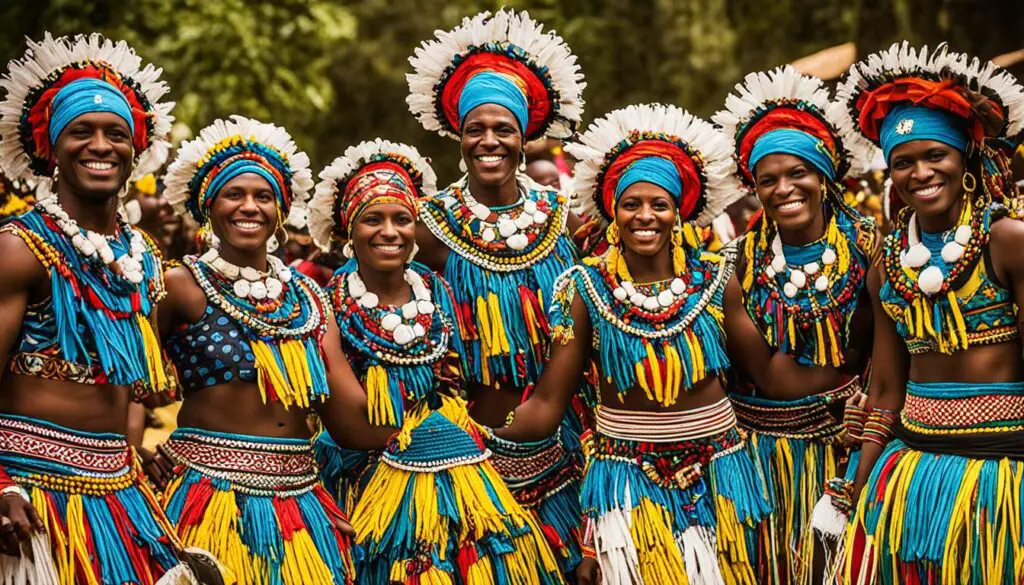
Continue reading to learn about the indigenous ethnic groups of Cameroon and their unique cultural practices that have stood the test of time.
Indigenous Ethnic Groups of Cameroon
Dive into the fascinating world of the indigenous ethnic groups that have been an integral part of Cameroon’s history for centuries. These groups, including the Baka, Bakweri, and Mafa, have a deep connection with the land, embodying a unique way of life and preserving rich cultural traditions.
The Baka people, also known as Pygmies, are one of the oldest indigenous groups in Cameroon. They have a profound understanding of the forest and rely on hunting, gathering, and fishing for their sustenance. The Baka are renowned for their exceptional knowledge of medicinal plants and their harmonious coexistence with nature.
The Bakweri, hailing from the southwestern region of Cameroon, are known for their strong cultural identity and rich oral traditions. With their expertise in fishing and farming, the Bakweri have developed sustainable agricultural practices that have sustained their communities for generations.
The Mafa, residing in the northern part of Cameroon, are a pastoral community known for their close connection with their livestock. The Mafa people have a vibrant culture, characterized by elaborate traditional ceremonies and dances that celebrate their heritage.
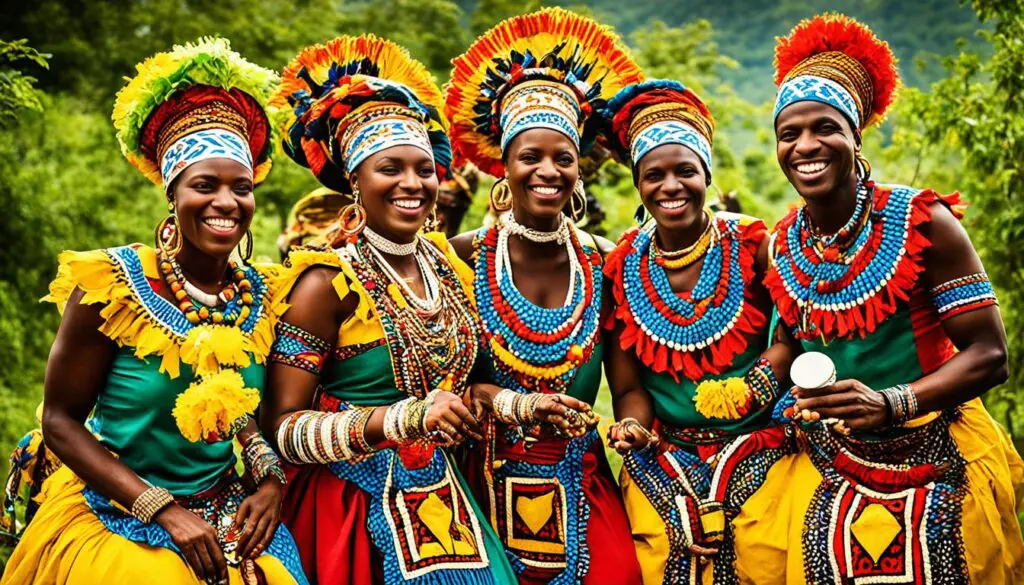
Immerse yourself in the diverse traditions, customs, and way of life of these indigenous ethnic groups. Through their stories, music, dance, and art, the Baka, Bakweri, and Mafa offer a glimpse into the rich tapestry of Cameroon’s indigenous heritage.
Ethnic Conflict and Unity in Cameroon
Cameroon, with its rich ethnic diversity, has unfortunately experienced periods of ethnic conflict throughout its history. These conflicts have stemmed from various issues, including resource allocation, political power struggles, and cultural differences.
However, Cameroon is also a country that strives for ethnic unity and national integration. Efforts have been made to promote interethnic understanding, respect, and harmony, with the goal of forging a strong and unified nation.
Recognizing the importance of dialogue and reconciliation, Cameroon has implemented initiatives to address ethnic tensions and build bridges between different communities. These initiatives aim to foster mutual respect, appreciation, and collaboration among all ethnic groups.
Historical Context of Ethnic Conflicts
Understanding the historical context of ethnic conflicts in Cameroon is crucial to grasp the root causes and complexities of these tensions. The country’s colonial past, as well as post-independence political dynamics, have influenced the development of ethnic tensions.
As Cameroon continues to navigate its post-colonial journey, it faces the challenge of reconciling various ethnic identities and aspirations within a unified national framework. This delicate balancing act requires ongoing dialogue, inclusivity, and respect for diverse cultural heritage.
Promoting Ethnic Unity and Integration
Cameroon’s commitment to ethnic unity is reflected in various aspects of its governance and society. Efforts are being made to promote cross-cultural understanding and collaboration through education, cultural exchange programs, and inclusive policies.
By fostering a sense of shared national identity alongside ethnic pride, Cameroon aims to create a harmonious society where diversity is celebrated and ethnic conflicts are resolved through peaceful means.
Achieving ethnic unity in Cameroon requires addressing the underlying socio-economic disparities, promoting equitable development, and ensuring equal opportunities for all of its citizens, regardless of their ethnic background.
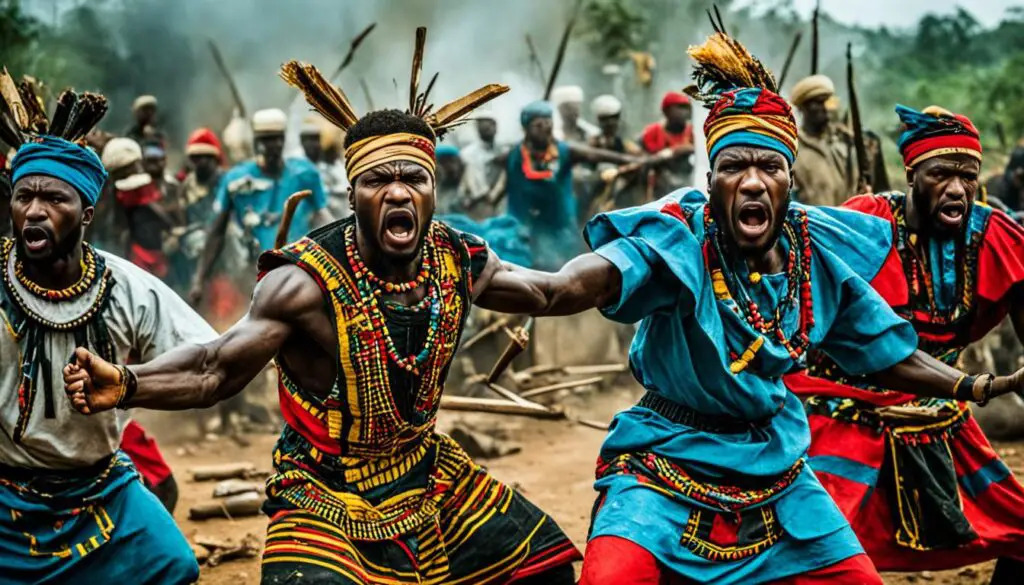
Traditional Festivals and Celebrations
Immerse yourself in the vibrant and colorful world of traditional festivals in Cameroon. These celebrations bring together various ethnic groups, each with their unique customs and traditions, showcasing the country’s rich cultural heritage.
Cameroon is renowned for its diverse range of festivals that take place throughout the year. From the vibrant costumes and lively music to the captivating dance performances, these festivals offer a glimpse into the traditions and history of the different ethnic communities.
One such festival is the Ngondo Festival, celebrated by the Sawa people of coastal Cameroon. This event aims to honor the ancestral spirits and seeks guidance for the fishing communities. Witness the mesmerizing boat races on the Wouri River as participants display their skills and prowess.
Another notable festival is the Nguon Festival, celebrated by the Bamoun people. This event showcases the cultural heritage of the Bamoun kingdom, with colorful parades, traditional dances, and theatrical performances. It is a time when the community comes together to renew their cultural values and preserve their identity.
During the Mankon Festival, held by the Bafut people, you can experience a grand display of traditional rituals, music, masquerades, and cultural performances. This festival symbolizes unity, with various clans participating in the festivities to celebrate their shared ancestry.
The traditional festivals in Cameroon not only provide an opportunity for ethnic communities to showcase their traditions but also offer a chance for visitors to immerse themselves in the vibrant culture of the country. From dancing in rhythm to the beat of traditional drums to witnessing elaborate ceremonies, these festivals are a feast for the senses.
So, if you’re looking to delve into the heart and soul of Cameroon’s ethnic celebrations, make sure to plan your visit during one of these vibrant traditional festivals. Experience the joy, energy, and cultural diversity that thrives within the country, leaving you with unforgettable memories and a deeper appreciation for Cameroon’s rich heritage.
Traditional Clothing and Adornments
Cameroon is a country known for its diverse and colorful traditional clothing, which reflects the cultural identity and pride of its various ethnic groups. Each group has its own unique style, designs, and symbolism associated with their traditional attire.
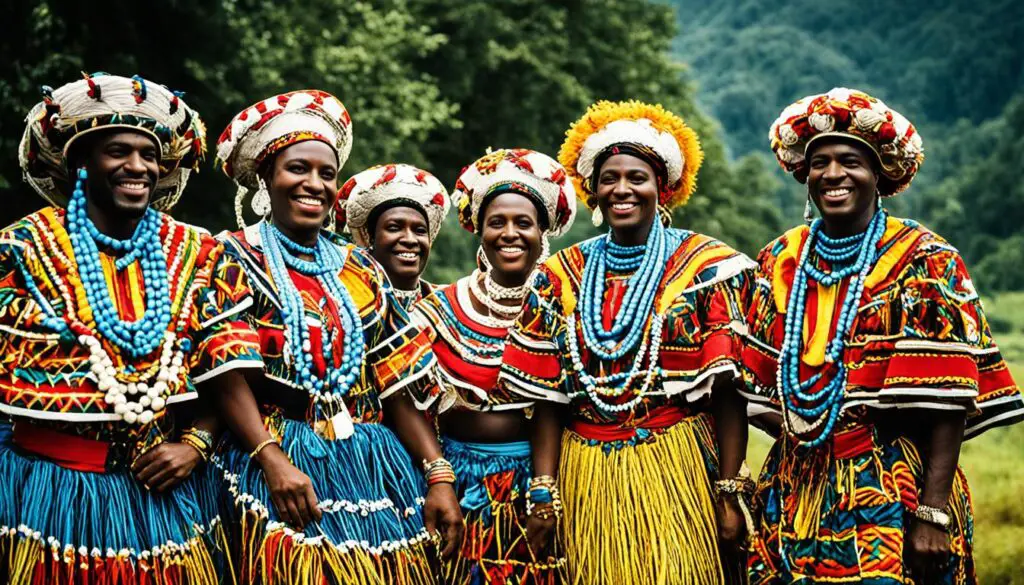
Traditional clothing in Cameroon represents more than just fashion; it is a visual representation of the customs, history, and social status of the wearer. Many garments are handmade and intricately designed, showcasing the rich craftsmanship of the local artisans.
Bamileke Clothing
One prominent ethnic group in Cameroon is the Bamileke, known for their ornate and vibrant attire. Their traditional clothing features bold patterns, colorful fabrics, and intricate beadwork. Men often wear a flowing gown known as the dashiki, while women adorn themselves with ndop, a type of embroidered fabric. The intricate embroidery and unique motifs on Bamileke clothing signify social status, clan affiliation, and personal achievements.
Fulani Attire
The Fulani, also known as the Peul or Fula, have a distinct traditional attire that reflects their nomadic and pastoral lifestyle. Men typically wear long robes called galle, which are loose-fitting and made from lightweight fabrics to provide comfort in hot climates. Women, on the other hand, wear colorful kaftan-style dresses known as riku or kafta. These dresses are often adorned with beautiful embroidery and are accessorized with elaborate headscarves.
Bakweri Garments
The Bakweri people, indigenous to the Southwest region of Cameroon, have their unique traditional garments. Women wear a wrap-around cloth called lapa, which is tied around the waist and falls gracefully to the ankles. Men don colorful shirts known as soma paired with trousers called nosoma. These garments are made using bright and vibrant fabrics, reflecting the lively spirit of the Bakweri culture.
Symbolism and Cultural Identity
The traditional clothing of Cameroon’s ethnic groups is deeply rooted in symbolism. Colors, patterns, and accessories hold significant meaning, representing aspects such as marital status, age, wealth, or religious beliefs. Through their attire, Cameroonians proudly display their cultural heritage, reinforcing a sense of identity and belonging.
Whether it’s the vivid and intricate patterns of the Bamileke, the nomadic elegance of the Fulani, or the vibrant Bakweri garments, traditional clothing in Cameroon is a captivating fusion of artistry, history, and cultural expression.
Traditional Cuisine and Culinary Delights
Indulge in the flavors of Cameroon as we explore the traditional cuisine of various ethnic groups. From fufu and ndolé to eru and kilishi, savor the culinary delights that reflect the diversity and richness of Cameroon’s ethnic gastronomy.
Cameroon’s traditional cuisine showcases the country’s vibrant multicultural heritage. Each ethnic group contributes unique recipes and cooking techniques that have been passed down through generations.
Begin your culinary journey with fufu, a staple dish made from pounded cassava, plantains, or yams. This starchy delight is often served with a variety of flavorful soups, such as egusi, made from ground melon seeds, or okra soup.
For a taste of the Western highlands, try ndolé. This dish features bitter leaves cooked with peanuts, crayfish, and various meats. It is often accompanied by plantains or boiled yams.
Eru, a traditional delicacy from the Southwest region, combines wild spinach with palm nuts and different types of meat or fish. The result is a rich and hearty soup bursting with flavors.
No exploration of Cameroon’s culinary delights would be complete without mentioning kilishi, a popular dried meat snack. Prepared by marinating beef or goat meat in a blend of spices and then sun-drying it, kilishi is a spicy, savory treat that can be enjoyed on its own or added to various dishes.
Cameroon’s cuisine is also known for its use of aromatic spices and herbs, such as ginger, garlic, turmeric, and njansang. These ingredients add depth and complexity to dishes, tantalizing the taste buds.
Whether you prefer spicy, savory, or aromatic flavors, Cameroon’s traditional cuisine offers a wide range of options to satisfy every palate. Embark on a culinary adventure and discover the delectable dishes that represent the cultural heritage of Cameroon’s diverse ethnic groups.
Art, Music, and Dance
Immerse yourself in the artistic expressions of Cameroon’s diverse ethnic groups. From elaborate woodcarvings to vibrant masks, Cameroon’s art scene is a treasure trove of cultural heritage. These exquisite works of art reflect the creativity and craftsmanship of the local communities, preserving their stories and traditions for generations to come.
Music is an integral part of Cameroonian culture, with each ethnic group having its own unique rhythms and sounds. Traditional instruments such as the balafon, ngoni, and talking drum create enchanting melodies that captivate the listener’s soul. Explore the vibrant music scene and discover the harmonious blend of traditional and modern influences that make Cameroon’s music truly exceptional.
Dance is a celebration of life in Cameroon, with various ethnic groups showcasing their distinct dance forms. From the energetic and rhythmic movements of the Bamileke tribe to the graceful and elegant dances of the Bassa people, Cameroon’s dance traditions are a spectacle that embodies the spirit and identity of its diverse communities.
Experience the art, music, and dance of Cameroon firsthand by attending cultural festivals and performances. These events provide a platform for artists, musicians, and dancers to showcase their talents and offer visitors a unique opportunity to immerse themselves in Cameroon’s vibrant cultural tapestry.
Preserving Cultural Heritage
Preserving cultural heritage is of paramount importance in Cameroon, as it protects and promotes the rich traditions and practices of the country’s ethnic groups. Various initiatives have been implemented to safeguard this invaluable heritage, ensuring its longevity and accessibility for future generations.
One essential aspect of cultural preservation in Cameroon is the establishment of museums that showcase the diverse artifacts and historical objects from different ethnic groups. These museums serve as repositories of cultural knowledge, allowing visitors to learn about the customs, rituals, and artistry of Cameroon’s indigenous communities. The artifacts on display provide a tangible link to the past and contribute to the preservation of cultural identity.
In addition to museums, cultural festivals play a vital role in the preservation and promotion of Cameroon’s heritage. These festivals bring together people from various ethnic backgrounds to celebrate their traditions through music, dance, and other artistic expressions. Festivals such as the Ngondo Festival, Bafut Cultural Festival, and Nguon Festival provide a platform for showcasing the uniqueness and diversity of Cameroon’s ethnic groups, fostering a sense of pride and unity among participants.
Education and awareness-building programs also contribute to the preservation of cultural heritage. Schools and community centers provide opportunities for younger generations to learn about their cultural roots, fostering a strong sense of identity and appreciation for their heritage. Through these programs, traditional practices and values are passed down, ensuring the continuity of Cameroon’s cultural heritage.
Efforts to preserve cultural heritage are a testament to Cameroon’s commitment to celebrating diversity and protecting the legacy of its ethnic groups. By valuing and promoting these traditions and practices, Cameroon ensures the preservation of its cultural wealth for generations to come.
Conclusion
In conclusion, exploring Cameroon’s ethnic groups allows us to appreciate the extraordinary diversity that flourishes within the nation. From their rich traditions and vibrant celebrations to their expressive art and flavorful cuisine, the ethnic groups of Cameroon form a tapestry of cultural beauty and unity. Immersing yourself in the richness of Cameroon’s ethnic heritage is an opportunity to witness the strength and resilience of a country that values and cherishes its cultural identity.
As you embark on your own cultural journey through Cameroon, you will encounter a kaleidoscope of customs, rituals, and beliefs that have been passed down through generations. Whether you witness the exuberant dances of the Bamileke people or savor the delectable flavors of traditional cuisine, each experience will deepen your understanding of the diverse tapestry that defines Cameroon.
Cameroon’s ethnic groups foster a sense of pride and unity, embracing their individuality while recognizing the importance of interethnic harmony. By preserving their cultural heritage, they contribute to the vibrant mosaic that is Cameroon’s society. Through initiatives such as museum exhibits, cultural festivals, and educational programs, the nation works towards safeguarding and promoting the legacy of its ethnic groups, ensuring that their traditions remain alive for future generations to cherish and learn from.
FAQ
What is the significance of ethnic diversity in Cameroon?
Ethnic diversity in Cameroon is significant as it contributes to the country’s cultural richness. It brings together various customs, languages, and practices, creating a vibrant tapestry of traditions.
Which are the largest ethnic groups in Cameroon?
Some of the largest ethnic groups in Cameroon include the Bamileke, Bantu, and Fulani. These groups have played a significant role in the country’s history, traditions, and overall development.
Who are the indigenous ethnic groups of Cameroon?
Cameroon is home to several indigenous ethnic groups, such as the Baka, Bakweri, and Mafa. These groups have a rich cultural heritage and a unique way of life, closely tied to the natural environment.
How does Cameroon strive for ethnic unity and national integration?
Cameroon has made efforts to promote interethnic understanding and harmony. Initiatives are in place to foster ethnic unity and national integration, ensuring peaceful coexistence among the diverse ethnic groups.
What are some traditional festivals celebrated in Cameroon?
Cameroon is known for its colorful and vibrant traditional festivals. Ethnic groups like the Bamileke, Bantu, and Fulani celebrate events such as Ngondo, Nguon, and Eyo Festival, showcasing their cultural heritage.
What is the significance of traditional clothing in Cameroon?
Traditional clothing in Cameroon represents cultural identity and pride. Different ethnic groups have unique garments adorned with symbols and patterns that showcase their rich heritage and traditions.
What are some popular dishes from Cameroon’s ethnic cuisine?
Cameroon’s ethnic cuisine offers a wide range of flavors. Traditional dishes like fufu, ndolé, eru, and kilishi highlight the diversity and richness of the country’s gastronomy, influenced by various ethnic groups.
What forms of art and entertainment are prominent in Cameroon?
Art, music, and dance play crucial roles in Cameroon’s cultural tapestry. Intricate woodcarvings, vibrant masks, rhythmic music, and energetic dances are some of the artistic expressions that showcase the ethnic groups’ creativity.
How is Cameroon preserving its cultural heritage?
Cameroon has implemented initiatives to preserve and safeguard its cultural heritage. Through museum exhibits, cultural festivals, and other preservation efforts, the country emphasizes the importance of maintaining the diverse traditions of its ethnic groups.
What can exploring Cameroon’s ethnic groups teach us?
Exploring Cameroon’s ethnic groups allows us to appreciate the extraordinary diversity within the nation. From traditions and celebrations to art and cuisine, the ethnic groups form a vibrant tapestry that reflects Cameroon’s strength and unity.